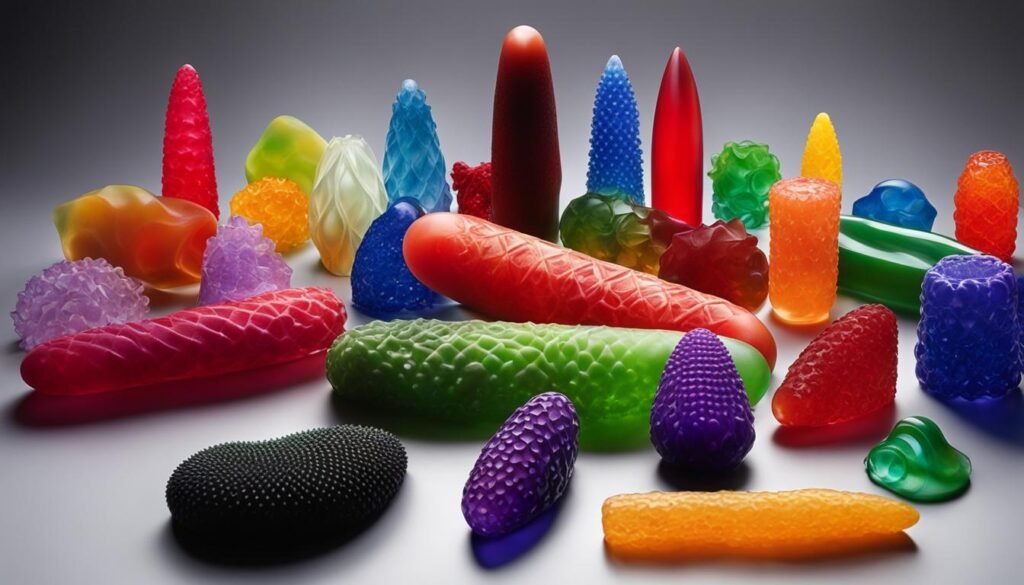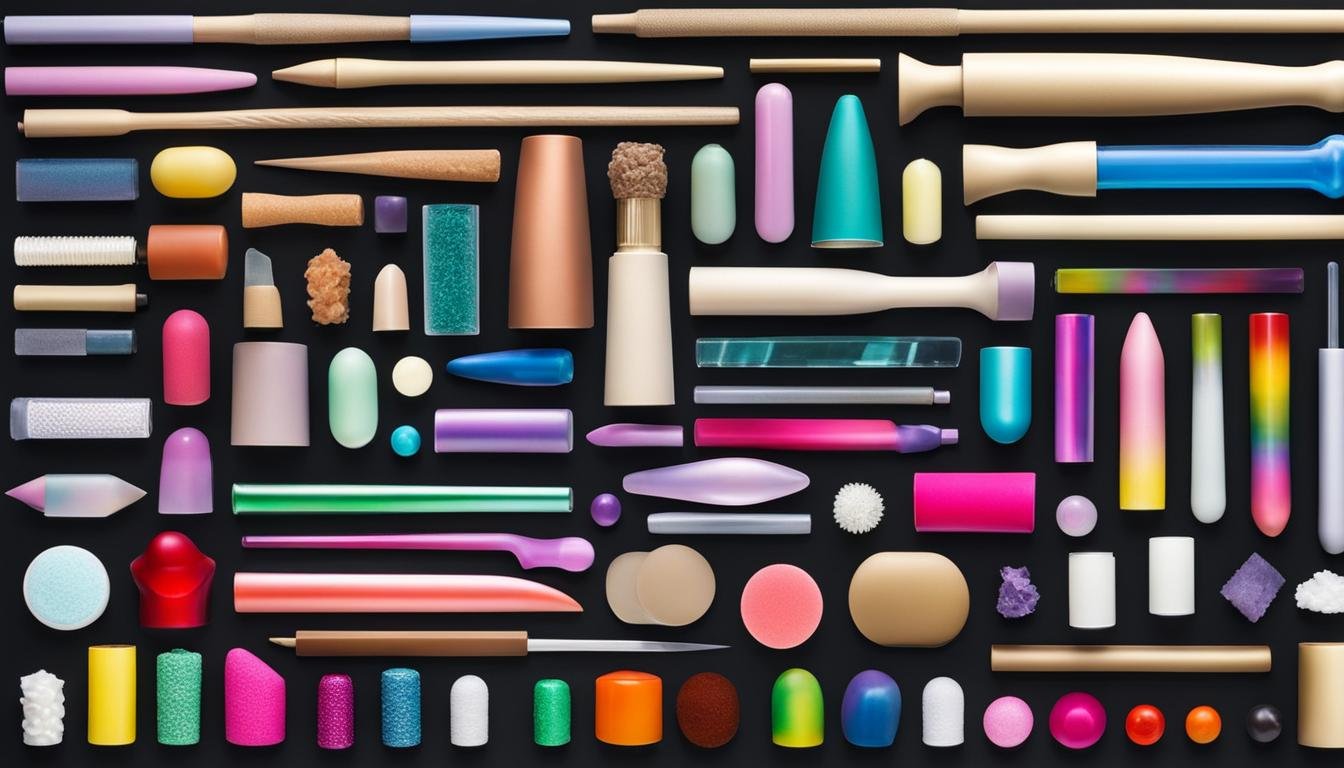Dildos are popular sex toys that come in a variety of materials. Understanding the different materials used in their production is essential for choosing a safe and comfortable option. In this guide, we will explore the main materials used in dildos, including silicone, glass, rubber, and jelly. We will also discuss the importance of body-safe materials and proper cleaning and care.
Key Takeaways:
- There are various materials used in dildo production, including silicone, glass, rubber, and jelly.
- Silicone dildos offer a lifelike feel, durability, and hypoallergenic properties.
- Glass dildos are visually stunning, non-porous, and suitable for temperature play.
- Rubber and jelly dildos are affordable but less durable and porous, requiring extra care and cleaning.
- Choosing body-safe materials is crucial for safety and comfort during use.
Silicone Dildos – Lifelike Feel and Long-Lasting Quality
Silicone dildos are a popular choice among sex toy enthusiasts for their lifelike feel and long-lasting quality. Made from high-quality silicone, these dildos provide a realistic experience that closely mimics the texture and sensation of human skin. Whether you’re looking for a soft and flexible option or a firm and rigid one, there’s a silicone dildo out there to suit your preferences.
One of the key advantages of silicone dildos is their hypoallergenic properties. Unlike some other materials, silicone is less likely to cause allergic reactions or skin irritation, making it a safe and comfortable option for most people. Additionally, silicone is non-porous, which means it doesn’t absorb bodily fluids or harbor bacteria. This not only makes silicone dildos easier to clean but also reduces the risk of infections and ensures a hygienic experience.
Another feature that sets silicone dildos apart is their ability to adapt to body temperature. Unlike materials that can feel cold or overly warm to the touch, silicone quickly warms up to match the body’s natural heat, providing a more realistic and comfortable experience. This feature adds to the overall pleasure and intimacy that silicone dildos offer, making them a favorite among users seeking a lifelike sensation.
Glass Dildos – Stunning, Non-Porous, and Temperature Play
Glass dildos are a popular choice among enthusiasts for their stunning aesthetic appeal and unique properties. Made from high-grade, non-breakable glass, these dildos are not only visually appealing but also safe to use. The non-porous nature of glass makes it an excellent material for sex toys as it does not absorb bacteria, ensuring easy cleaning and maintenance.
One of the standout features of glass dildos is their ability to withstand temperature changes. This opens up a whole new world of sensory pleasure and experimentation. You can dip your glass dildo in warm water or cool it down in the refrigerator for different sensations. Just remember not to freeze or microwave the dildo, as extreme temperatures can cause the glass to crack or shatter.
Another advantage of glass dildos is their smooth and firm texture, which provides precise stimulation and can enhance your intimate experiences. Glass is also compatible with all types of lubricants, making it even more versatile. Whether you prefer internal or external stimulation, glass dildos can provide a luxurious and pleasurable experience.
While glass dildos are generally durable, it is essential to handle them with care. Avoid dropping or banging them against hard surfaces to prevent any potential damage. Additionally, always ensure that you purchase your glass dildo from a reputable brand to ensure the highest quality and safety standards.
Rubber and Jelly Dildos – Affordable, but Less Durable and Porous
When it comes to affordable options in the world of dildos, rubber and jelly materials often come to mind. These materials offer a softer and more flexible experience compared to other types of dildos. They are also available in a wide range of shapes and sizes, including realistic designs that mimic the look and feel of a real penis.
However, it’s important to note that rubber and jelly dildos do have some drawbacks. One major concern is their porous nature, which means they can absorb bacteria and be difficult to thoroughly clean. This makes proper hygiene practices, such as using a condom or toy cleaner, crucial when using these types of dildos.
Additionally, rubber and jelly materials tend to be less durable compared to options like silicone or glass. They can easily tear or degrade over time, especially with frequent use or exposure to certain lubes. To ensure longevity, it’s important to carefully inspect the quality of rubber or jelly toys and handle them with care.
In summary, rubber and jelly dildos offer an affordable and flexible option for those looking to explore their pleasure. While they may come with some compromises in terms of durability and cleanliness, proper maintenance and responsible use can help mitigate these concerns. Ultimately, the choice of material depends on individual preferences and priorities.
Things to Consider when Choosing Rubber or Jelly Dildos:
- Check the quality of the material and avoid toys with visible rips or tears.
- Use a condom or toy cleaner to ensure thorough cleaning and minimize the risk of bacterial growth.
- Consider the potential for allergic reactions and irritation, as some individuals may be sensitive to rubber or jelly materials.
- Handle rubber or jelly dildos with care to prevent tearing or damage.
- Keep in mind that these materials may deteriorate over time, so regular inspection is important.

The Importance of Body-Safe Materials and Product Regulation
When it comes to choosing a dildo, prioritizing body-safe materials is essential for your health and comfort. Unfortunately, the lack of government regulations for sex toys raises concerns about product safety. That’s why it’s important to be informed and make conscious choices.
Reputable brands understand the significance of using body-safe materials. Materials like silicone, glass, and metal are non-toxic and non-porous, making them easy to clean and reducing the risk of bacterial growth. Look for phthalate-free and food-grade silicone options, as these are considered the gold standard for body-safe dildos.
While regulations may vary by country, it’s still vital to educate yourself about the materials used in the dildos you’re considering. Quality brands often go above and beyond, subjecting their products to voluntary testing and adhering to the highest safety standards.
In addition to choosing body-safe materials, using condoms with your dildo can provide an extra layer of protection. This is especially important if you’re unsure about the material or if you’re sharing the toy with a partner. Condoms can help prevent the spread of bacteria and STIs, ensuring a safer experience.
By being aware of product regulation and choosing high-quality, body-safe materials, you can enjoy your dildo with peace of mind. Remember, your health and well-being should always come first when it comes to your sexual pleasure.
FAQ
What are dildos made of?
Dildos can be made from various materials, including silicone, glass, rubber, and jelly.
Why is silicone a popular choice for dildo materials?
Silicone is favored for its lifelike feel, hypoallergenic properties, durability, and non-porous nature.
Are glass dildos safe to use?
Yes, glass dildos are safe to use as they are made from high-grade, non-breakable glass that is non-porous and hypoallergenic.
Can glass dildos withstand temperature changes?
Yes, glass dildos can withstand temperature changes, allowing for temperature play. However, avoid freezing or microwaving them.
Are rubber and jelly dildos a good option?
Rubber and jelly dildos are affordable options but have some drawbacks. They are softer and squishier but less durable and porous, making them more difficult to clean.
What materials are considered body-safe for dildos?
Body-safe materials for dildos include silicone, glass, and metal. These materials are non-toxic, non-porous, and easy to clean.
Are there government regulations for sex toys?
Currently, there is a lack of government regulations for sex toys. It is important to choose reputable brands that prioritize product safety and use body-safe materials.

